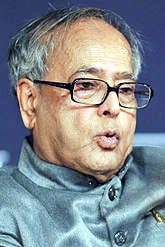HYDERABAD, Jan 17:
Every minute a child goes blind in the world, President Pranab Mukherjee lamented today.
Outlining the importance of collaborative initiatives as need of the hour to fight blindness and visual impairment, he urged the private sector companies and government institutions to join hands to fight the disease.
In his inaugural speech at the 28th Congress of Asia-Pacific Academy of Ophthalmology here, Mr Mukherjee said the need for collaborative initiatives is important as even comparatively simple interventions at the appropriate time would help in preventing blindness.
“Private sector companies and government institutions should join hands to fight blindness and visual impairment. The private sector companies should not consider this a burden but as a way of discharging their obligations,” he said adding that the private sector would also help in increasing their sales and earnings through reduction in the incidence of blindness and poverty.
Mentioning the Vision document 2020 of World Health Organisation (WHO), the President said the problem of blindness can only be combated through increased political and professional commitment, provision of high quality eye care, besides increasing awareness and support of NGOs and private players. “This is where I would request you all to step in,” he stated.
Mr Mukherjee said, “Several programmes for controlling blindness have been launched in India like the National Programme for Control of Blindness. These programmes have yielded appreciable results. But governments alone would not be able to combat blindness as effectively as collaborative ventures or the initiatives the two can together forge.”
Mentioning a study report of the University of California, the President said about 85 pc of all impairment and 75 pc of blindness in the world could have been either prevented or cured. It has particular relevance for the less developed countries as around 90 pc of the world’s blind reside in developing countries.
Describing the sad reality that every minute a child goes blind in the world, Mr Mukherjee stated, “Besides in developing countries, even when adults are sightless, children are often responsible for leading the adults. Consequently, such children find it difficult to attend school thereby restricting their prospects for education employment opportunities.”
Urging upon the ophthalmologists of the country not to count their success in terms of their economic prosperity, the President stressed the need to serve the people they can help prevent from becoming blind or by giving sight to those who live without it.
Saying poverty periscopes an individual to blindness, the President said, “It increases the economic burden by curtailing employment opportunities and diversion of resources for its treatment. Empirical studies show that low incomes not only contribute to higher incidence of blindness but 64 pc of the disabled slip into to poverty after the onset of visual impairment.”
The Congress is being held in India for the second time, after a gap of nearly 28 years under the aegis of All India Ophthalmological Society (AIOS) and Asia Pacific Academy of Ophthalmology (APAO).
Earlier, Andhra Pradesh Chief Minister Kiran Kumar Reddy received the President at the Begumpet Airport. (UNI)
Trending Now
E-Paper


